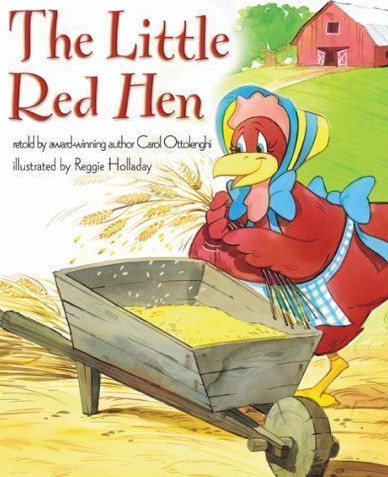
Have you ever noticed that the simplest truths in life and business are taught in Kindergarten? These lessons are so simple a child can figure them out, and yet we often forget to apply these simple lessons in business. Recently I have been thinking about the story of “The Little Red Hen”
“The Little Red Hen” is an American fable about a hen living on a farm who finds some wheat and decides to make bread with it. She asks the other animals on the farm for help in tilling the soil, they refuse. She asks for help in planting the seed, and they all refuse. She asks for help in harvesting the wheat, but again they all refuse. Finally, she asks for help in grinding the wheat into flour and baking the bread, but again they all refuse. In the end, she does all the work herself and bakes the bread. She then asks who will eat the bread, and this time everyone is willing to join in. However, she refuses to allow them to join in, and instead enjoys the bread with her family. (You can read the full story here)
I have thought of this story a lot recently, as it highlights three important leadership principles that have a dramatic impact on our world when executed properly. I would capture them in the Acronym of RED.
R- Relatable Mission – In the story above the Little Red Hen was on a mission which was to feed her family. Notice that this mission was about accomplishing something for someone else. Most company mission statements are built around what that company will do to improve the lives of others with their products, which will in turn help them. Having a defined mission everyone can rally around that is bigger than any one person is the key to success for your team. Having a vision is helpful to provide a direction for your team, but a mission is something everyone can grab on to that enables them to leverage their passion and join with the company to make a difference in the world.
In my prior company we had one mission, ensure that all 911 calls were delivered to a call taker so that the public could get the emergency support they needed as quickly as possible. This mission was so clear that employees would devote extra hours and attention to ensure the quality of services being provided met an extremely high bar. As with any project, we had extremely heated debates about how a given service should be deployed, but not once did these debates turn personal. They were never driven by what a given employee could gain, but rather by how the solution could best meet our greater mission.
E- Enable Others – Notice that during the story of the Red Hen, she continually made it possible for others to find a way to help. She asked for help and she made it possible for each to contribute to the success by helping. She did this without wavering on her mission, even if the mission meant she would do it alone. As a leader, it is your job to enable those around you to assist in the overarching mission of the team. This means ensuring they understand what the goal is, what they can do to help, and then providing the context of what will be achieved when that mission is met. So, make a habit of asking yourself: “am I enabling others to successfully join the work?”
Often in our workplace, leaders do not provide clear direction on why a given objective was critical. This is a common occurrence in enterprise scale companies where teams often forget to convey the greater good the program will deliver. Especially in these settings it is key that mission statements are clearly and continually articulated. It is also important to identify individuals who are willing to buy into and execute the mission. Although it is becoming increasingly difficult to find individuals willing to step in and help, it is vital that we continue to set the stage for those around us to have that opportunity.
D- Deliver Business Value – Once you have articulated and bought into the mission, never ever give up. The Red Hen had one mission: feed her family. That mission drove everything else about what she did. In your life and leadership make sure your mission has a crystal-clear focus, and then committedly stick to that focus.
In my career I have been in numerous programs where support does not arrive until the very last minute, as occurred in this story. It is always fascinating to watch those who provided no value during the program, or who were even strong dissenters,, suddenly ready to engage when it is time for success to be realized. As leaders, we must be on constant guard for this behavior and ensure that the recognition for success is given to those who made success possible. This intentionality motivates these hard-working individuals to more passionately move forward to the next program and helps deter the ongoing behavior of seeking credit without commitment. There will always be people, processes, and critics who want to steal the focus. Do not let that happen. Stay focused, stay grounded, and passionately pursue your mission!

